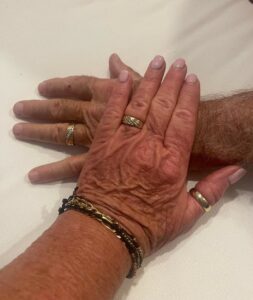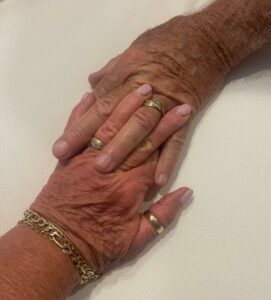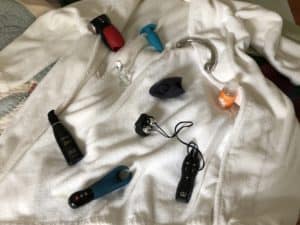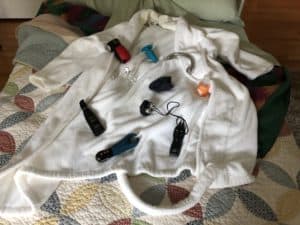Posts Tagged ‘aging’
What Matters and What Doesn’t As We Age: Reflections on Turning 81

Aging is a precious gift. Those of us who age did not die young. A year ago as I approached my 80th birthday, I promised myself that I would write an article titled “What Matters and What Doesn’t As We Age: Reflections on Turning 80.” I wanted to reflect on what does and doesn’t matter about our changing appearance, bodies, sexuality, capabilities, relationships, hopes, fears, and how we want to live our lives while we can still make these decisions.
I took notes and thought about it a lot, but I didn’t get it done, maybe because I was too busy living: traveling to Australia, giving presentations and media interviews, taking on new writing projects, and abruptly facing new health challenges. Now that I’m about to turn 81, with another year lived and pondered, it’s time for “What Matters and What Doesn’t As We Age: Reflections on Turning 81.”
Some Things I’m Experiencing:
I always pictured 80 as a last gasp before dying. Struggling to hang onto the threads of daily needs and functions, with little or no quality of life. I acknowledge that I’m the recipient of great privilege to say that my brain still works well — not as well as when I was younger and sharper, but well.
My memory never was great, and it’s worse now. I struggle for the right word more often. I have to create routines and tricks to keep track of my phone, my glasses, my coffee mug. Several times a day I stride purposely into a room only to realize I don’t remember what I came here to do. (Fortunately, the elusive intention comes back quickly — so far!) When leaving the house, I have to check that my shoes match!
I’m still writing professionally and giving speeches and interviews internationally. I’m at the top of my career. Retire? Ha! And yet I’ve peeled back my activities to do those that matter most to me, saying “no” more often than “yes” to new projects and invitations.
Health is one thing after another at my age. Some things resolve after a day. Some require medical interventions. Some I need to live with. I don’t care to get into the details, but let’s say I deal with medical issues every day. As Larry Kassman, retired emergency physician and my dear, wise brother, told me, “Our bodies aren’t made to last forever.”

Some Background that Matters
I nearly didn’t make it to age 36, when an automobile accident almost killed me. I suffered many critical injuries, including a smashed face that had to be reconstructed from photographs, a jaw broken in 6 places, a neck fracture, and – the part that couldn’t be fixed — a shattered heel and ankle.
“You’ll walk again,” doctors told me, “but maybe not normally or painlessly.”
“I don’t care about walking normally — I want to dance!” I replied.
A year later, I was teaching aerobic dance. Later I switched to teaching line dancing — which I still do, with great joy!
I’m privileged and grateful that my body works as well as it does. I know firsthand what it looks like and feels like to lose the ability to walk, to eat solid food, to be physically independent. I’m grateful that I’m functioning now, and I know that could change at any moment.
What Does Matter
- Staying connected to the people we love and who love us.
- Keeping love and sexual pleasure alive with intention.
- Keeping our brain active by reading and learning something new every day.
- Doing the activities we care about and letting go of those we don’t.
- Helping others with our knowledge, skills and kindness.
- Staying physically active to the extent we’re able.
- Sharing what we’re learning about aging so it’s less mysterious to others — and to ourselves!
What Doesn’t Matter

Looking older. Wrinkles. Goodness yes, every part of me has wrinkles. Even my wrinkles have wrinkles! I am fascinated by my forearm wrinkles when I hold up my arm to let gravity put on a show. If I turn my wrist slowly, I get a display of changing patterns and textures. Sorry I can’t include a video.
The skin of my thighs, still strong and muscular from more than half a century of dedicated daily exercise, is nonetheless so wrinkled that it seems to fold in on itself. But so what! These thighs still let me walk three miles a day and dance for two hours.
Here’s how I see my aging appearance: When I was young, my genes determined how I looked. Now my age and experience determine how I look. I am happy with that.
Framing My Goals
What will I do today to give myself a sense of accomplishment?
What will I do today to give myself joy and calm?
What will I do today to support my health and wellbeing?
My Advice (if you want advice) from turning 76 in 2019, still useful:
- Move as much as possible — your health depends on it.
- Adopt the “if not now, when?” mindset and live your bucket list now.
- If your relationship situation needs changing, change it.
- Put plans in place now that you might need later: financial, healthcare, will, advance directive.
- Take care of things now that you don’t want your loved ones to have to figure out when you’re unable.
- Spend time with friends — we don’t know how long they’ll be with us.
- Tell the people you love that you love them.
- Learn from the past, celebrate the present, be unafraid of the future.
My Messages to Myself and to You:
- Keep moving, keep learning, keep helping others.
- Some things we can control; others we can’t. Let’s put our efforts into what we can control, change, make better.
- We may be challenged as we age, but we don’t have to be diminished.
- Every year, every day, every step we take is a gift.
- Instead of the fruitless search to regain our youth, let’s celebrate our age and dance forward into the years ahead.
Your Turn:
What matters and what doesn’t as you age? I’d love to hear from you. Please comment, and include your age.
Kissing Scars by Tch
Note from Joan: “Tch,” who is in his early 80s, sent me this with permission to share it with you. I love his attitude, his ability to adapt, and his dedication to sexual pleasure for his partner(s) as well as himself. May we all grow old with this zest and wisdom!
I’m old. Over the last few years that has become more and more obvious to me.
I don’t regret getting old. I’ve had a really good time getting here.
And life is still good.
If you are old like me, you have likely noticed the signs. Scars on both knees filled with titanium, a missing molar, thinner skin, sags. I told my urologist the other day that my penis seemed a little blotchy. He smiled and ran his hand down my leg and said, “Looks a lot like the rest of your skin.”
My reason for seeing him was to check on my penile implant which makes my blotchy penis do what it used to do on its own. Another scar where the implant was inserted. I fondly remember the days when “waiting” to cum used to take a Herculean effort. Now, the reverse is true.
Let me tell you a little about scars.
They are the price we pay for the experiences of life, good and bad. I don’t begrudge for a minute the titanium knees. The original set carried me faithfully through many a tennis match, hikes into the wilderness, scuba in the depths, farming, building, carrying grandchildren, life.
I have noticed that some my age try to hide their scars and other non-youthful signs. “Cover up” is often the motto of the day. And so, many older people miss out on the beauty of getting older.
I am so much better at pleasing a woman at my age than I ever was as a young or middle-aged man.
What used to be a 15-minute rush (exaggerating a bit on the high side) is now a lovely hour or more with time to spend on all those places that used to be missed in the urgency.
My wife and I are swingers. We are in our early eighties. We have really good sex with each other and with other couples when we and they choose. Younger people might imagine that we can’t possibly be as enthusiastic about sex as they are. They should be excused for their inexperience.
What some of us older folks know
Scars got us where we are. They are not repulsive, but endearing. Scars of childbirth and life saving surgeries, reconstructed breasts, blotchy skin, and too many pounds all come with age. They can all be the path to intimacy beyond what youth can know. Kissing a scar can lead to trust and understanding that only the old can fully appreciate.
Please allow yourself the recognition that great sex, at any age, is about sharing, touching, giving, honoring, and loving. When you share those with your partner, scars and imperfections are paths to sexual intimacy.

Dry Orgasm
Dry Orgasm
by Shamus MacDuff
My first dry orgasm surprised me. I was reveling in the myriad delightful sensations of my orgasm, when my partner observed that there was no semen. Really? It felt the same as other orgasms with ejaculation. This struck me as unusual or even unnatural. My partner reassured me that a “dry orgasm in men” was normal – the first I’d heard that term! I didn’t know then that ejaculation is unnecessary to experience orgasm.
“Ejaculation is an event that takes place in the penis,” explains Dr. Andrew Siegel. “Orgasm occurs in the brain.” Occasional orgasms without ejaculation — “dry orgasms” — are common as we age, and in most cases are no cause for alarm. A dry orgasm occurs when a penis owner reaches sexual climax without ejaculation — no fluid emerges from the penis.
As penis owners, we’re used to sexual climax involving these components:
- Emission (secretions deposited into the urethra)
- Ejaculation (contractions of the pelvic floor muscles that push the seminal fluid out the urethra in an explosive eruption)
- Orgasm (the intense emotional feelings that accompany the physical act of ejaculation)
Many of us are surprised and worried the first time we have a dry orgasm. Thankfully, in most cases, there’s nothing to fret about. It is quite common to climax and ejaculate “wetly” in some sexual encounters, and to orgasm “dryly” on other occasions.

Michael Castleman
Like me, most penis owners experience intense pleasure when orgasming, whether it’s wet or dry. Dry orgasms happen normally from time to time. Their frequency increases with age, as they accompany other age-related changes. Michael Castleman, sex journalist for 46 years and author of Sizzling Sex for Life: How to Maximize Erotic Pleasure at Any Age, explains,
“Menopausal women notice vaginal dryness and atrophy. Men notice that the volume of fluid in their ejaculations gradually declines, and in some men over 70, more or less disappears.”
With aging, the prostate gland enlarges. The pelvic floor muscles also weaken, diminishing the power of ejaculation. These are normal age changes and may contribute to dry orgasms. There’s usually no reason for worry about the occasional dry orgasm. However, if you begin to experience dry orgasms regularly, consult a doctor to find out what might be causing this.
Some medical conditions may contribute to frequent dry orgasms, such as surgery to remove the prostate as a treatment for prostate cancer. As Michael Castleman notes, “Afterwards, they still come, but any seminal fluid spurts not out of the penis, but backwards into the bladder, where it mixes with urine and leaves the body during urination.”
Medical causes for dry orgasms include
- Removal of the prostate and seminal glands
- Laser prostate surgery
- Radiotherapy to treat prostate cancer
- Operations for testicular and bladder cancer
- Diabetes
- Multiple sclerosis
- Spinal cord injuries
- Some drugs, such as Flomax to control urinary problems and various blood pressure and psychiatric medications
- Severe emotional stress and other situational psychological issues
All of us experience changes in our sexual selves as we age. We take longer to reach an erection (here’s where sex toys and lubricants can assist!), and our erections are not as firm or reliable as they once were. Our refractory period after ejaculation increases, and the amount of ejaculate we produce decreases. On occasion, we don’t produce seminal fluid, and we experience a dry orgasm.
All of this is simply a normal part of growing older and no cause for upset. I find that when my own dry orgasms occur, they are every bit as powerful and satisfying as their juicier and more frequent counterparts. I wish you the same. And, if you’re still worried, consider this comment from Michael Castleman:
“Dry orgasm has advantages. No wet spot. Women who never liked semen in their mouths and/or swallowing can provide fellatio more happily. And older men can self-sex with less messy evidence to dispose of. The key thing is to alert older men that this happens, that it’s normal and no big deal.”
I invite you to comment and share your own experience with dry orgasms.
Additional resources:
- “Ejaculation: What to Expect As You Age,” New Jersey Urology
- “Is It Normal, Doc? Five Changes All Men Experience as They Age,” Tower Urology
- “Should Men Worry About Dry Orgasms?” Sexual Medicine Society of North America
- “Dry Orgasm: Why It Happens and What You Can Do,” Healthline
— Shamus MacDuff, age 77, has been writing for this blog since 2017, when he wrote the popular post, “Sex without Penetration: A Man’s View.” Since then, he has become my reviewer of sex toys for penis owners. Read Shamus MacDuff’s other posts.

Go ahead and call me a “little old lady”!
In January 2007, in the early years of this blog, I wrote a post titled, “Don’t call me a ‘little old lady'”!” Thirteen years later, my feelings have completely changed. Here’s what I wrote then:
I’m always surprised by how acceptable it is in our society to call older people disparaging names.
I was reading a newspaper article today about Barack Obama’s popularity in Illinois, which quoted Emil Jones Jr, president of the Illinois Senate, as saying, “Sitting across the table from me was a little old lady, said she was 86 years old,” who hoped she’d live long enough to vote for Obama for President.
I was startled by reading this mature woman described as “a little old lady,” and I didn’t like it. OK, I’m little (4′ 10″), 63 years old, and female — but “little old lady” belittles my maturity and experience and sounds like it would be uttered while patting me on the head. Didn’t the 86-year-old elder deserve a more dignified description? If she had been male, would she have been described by Mr. Jones as “an old geezer”?
…I know there’s no consensus about what to call older people without offending us! I like the term “senior,” although I know some dislike it. I like “elder” because it connotes wisdom and sounds respectful, even reverent — but I don’t feel old enough to deserve being called an elder. “Mature” is a nice adjective, though “mature adult” sounds stilted.
Here’s how I feel now: If a little old lady can make her living writing and speaking about senior sex — which I do — and keep her body strong by teaching line dancing, practicing Pilates, and walking miles a day — all of which I do — then go ahead and call me a “little old lady.”
I feel I can own, even enjoy, being called “little old lady” at this time of my life. I’m little (4’10”) and old (76), and my life is thrilling, so what’s the problem? I’ve also grown into the term “elder” (though not “elderly,” please).
When Gloria Steinem turned 40 and a reporter told her she didn’t look 40, she said, “This is what 40 looks like!” We continue to redefine what aging looks like, feels like, and acts like. Join me!

“Little old lady” at age 75
Q to you: How do you feel about being called “senior,” “old,” and so on? I invite you to comment. You’ll see 18 comments from the first post — let’s add to those. I know we won’t all agree, so please disagree politely.

